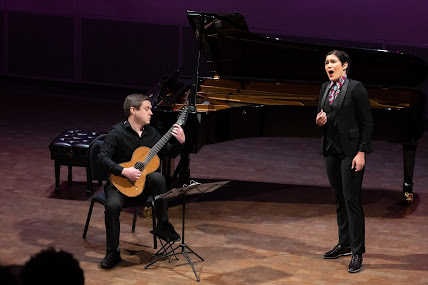My SFCV review of Livermore Valley Opera's Otello is now posted. Briefly, it is a rave. Joshua Kosman also raved, more eloquently than I did. Our vocabulary overlaps a bit; you'll find "electrifying" in both reviews. I didn't discuss one regular problem with productions of the opera, on the grounds that the production photos would speak to the issue.
This definitely falls under the rubric of "the little opera company that could." LVO has an annual budget of under $500,000, according to the 990 forms that I glanced at this weekend, and yet they've managed to stage a production of Verdi's Otello - a problem opera if ever there was one - that I found more dramatically cogent and just plain exciting than the last two bring-ups at San Francisco Opera, a company that spends roughly $1 million per performance.
I mean, those productions had issues. The 2002 production was announced with Ben Heppner singing the title role. He withdrew and was replaced by four tenors, each singing from one to four and a fraction performances. Yes, really: Jon Fredric West dropped out of the performance of October 26 after one act, with Antonio Barasorda singing acts 2, 3, and 4. I caught Vladimir Galouzine and remember him sounding vocally clumsy. Sergei Leiferkus, a wonderful singer in the right repertory, was badly miscast as Jago; he had the trill (YES THERE'S A TRILL THERE) but sounded nothing like an Italian baritone. Patricia Racette sang beautifully. I vaguely recall that Donald Runnicles wasn't at his best. I should check; I probably have notes someplace.
Okay, my comments about 2002:
Galouzine was okay, which is much better than anyone has said West was; it's the right kind of voice except that he sounds like a baritone. I don't just mean baritonal, I mean _baritone_, as in more of a baritone than Leiferkus. (I get impressions of nausea from everyone who has mentioned West.) Racette was terrific; Leiferkus sounds very dry and verging on wobble - at least he can trill and sound nasty at will.
The performance didn't really gel very well. The orch. was surprisingly sloppy and Runnicles seemed to be beating time at various points. The scene with the Venetian ambassador lost all momentum, for example.
The most recent production, in November, 2009, had completely different problems. I heard the last performance, and Nicola Luisotti's conducting sounded so disengaged that I figured he was already mentally checked out and on his way to guest conduct elsewhere. Marco Vratogna shouted most of Jago. Zvetelina Vassileva was forgettable, and had so little chemistry with Johan Botha that she never looked at him during the love duet! Botha...what can one say? He sang like an angel; I know that I'll never hear a more beautiful sound in the love duet. But he could not act, was facially inexpressive, and not very mobile on stage. It was a really dispiriting performance.
So it's a real thrill to see an Otello production that's firing on more cylinders than you would think possible: terrific singing from the three principals, real drama, good direction, and fiery conducting.
There are two more performances, on Saturday, March 12 at 7:30 p.m. and on Sunday, March 13 at 2 p.m. Really, you should go!














